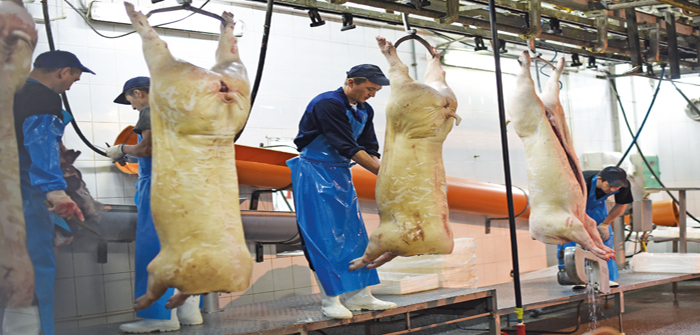Ongoing staff shortages hitting processing plants could lead to an influx of EU pork imports, NPA chief executive Zoe Davies told BBC Radio 4’s flagship Today programme on Saturday morning.
Dr Davies explained how a lack of staff due the number of eastern European workers that have returned home means abattoirs can no longer process the number of pigs producers are able to supply them with on a weekly basis.
- You can listen to the interview HERE (52 mins in)
She said: “For the last 6-8 week, all of the major processors have been cutting their kills by up to 25%, leading to pigs being kept on farms for far longer than they should be and that is leading to an absolute crisis for us on the pig side.”
The latest AHDB market data shows last week’s pig slaughterings were down by 24,000 head on last year, while average carcase weights are soaring, reaching 88.40kg last week – 1.19kg heavier than the week before, and 3.2kg heavier than a year ago.
Asked if the situation is likely to lead to retailers importing more EU pork, Dr Davies added: “The concern is that’s exactly what will happen. We have the pigs, we have the product and the British public wants to buy British pork. However, if the processors are unable to supply the volumes that are required, the likelihood is they will start to look elsewhere.”

She pointed out that with EU pork currently trading at 30p/kg less than UK pork due to oversupply issues, it provides a ‘perfect excuse for retailers to ship in much cheaper EU pork. “In our view, that is not what the British public voted for when they voted for Brexit,” Dr Davies added.
She warned that, with soaring costs of production and falling prices – producers lost between £24-£26/pig in the first half of 2021 – pig farmers are in an ‘increasingly desperate situation’.
“They are getting very stressed out and we are heading towards a situation where healthy animals may well need to be destroyed. This is putting people’s future at risk,” she added.
Andrew Opie, from the British Retail Consortium agreed the UK could become more reliant on EU imports if the situation continues and called for temporary visas to allow companies across the supply chain to use more EU workers, particularly in the haulage sector, into next year.




